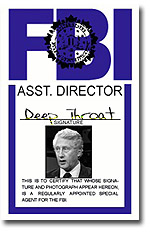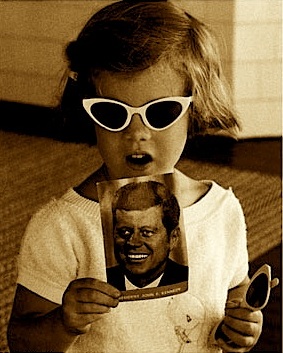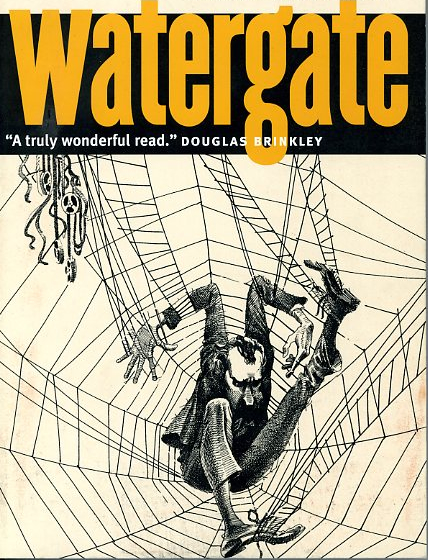NEW YORK TIMES: W. Mark Felt, who was the No. 2 official at the F.B.I. when he helped bring down President  Richard M. Nixon by resisting the Watergate cover-up and becoming Deep Throat, the most famous anonymous source in American history, died Thursday. He was 95 and lived in Santa Rosa, Calif. In 2005, Mr. Felt revealed that he was the one who had secretly supplied Bob Woodward of The Washington Post with crucial leads in the Watergate affair in the early 1970s. His decision to unmask himself, in an article in Vanity Fair, ended a guessing game that had gone on for more than 30 years.
Richard M. Nixon by resisting the Watergate cover-up and becoming Deep Throat, the most famous anonymous source in American history, died Thursday. He was 95 and lived in Santa Rosa, Calif. In 2005, Mr. Felt revealed that he was the one who had secretly supplied Bob Woodward of The Washington Post with crucial leads in the Watergate affair in the early 1970s. His decision to unmask himself, in an article in Vanity Fair, ended a guessing game that had gone on for more than 30 years.
The disclosure even surprised Mr. Woodward and his partner on the Watergate story, Carl Bernstein. They had kept their promise not to reveal his identity until after his death. Indeed, Mr. Woodward was so scrupulous about shielding Mr. Felt that he did not introduce him to Mr. Bernstein until this year, 36 years after they cracked the scandal. The three met for two hours one afternoon last month in Santa Rosa, where Mr. Felt had retired. The reporters likened it to a family reunion.
Mr. Felt played a dual role in the fall of Nixon. As a secret informant, he kept the story alive in the press. As associate director of the Federal Bureau of Investigation, he fought the president’s efforts to obstruct the F.B.I.’s investigation of the Watergate break-in. Without Mr. Felt, there might not have been a Watergate — shorthand for the revealed abuses of presidential powers in the Nixon White House, including illegal wiretapping, burglaries and money laundering. Americans might never have seen a president as a criminal conspirator, or reporters as cultural heroes, or anonymous sources like Mr. Felt as a necessary if undesired tool in the pursuit of truth.
Like Nixon, Mr. Felt authorized illegal break-ins in the name of national security and then received the absolution  of a presidential pardon. Their lives were intertwined in ways only they and a few others knew. Nixon cursed his name when he learned early on that Mr. Felt was providing aid to the enemy in the wars of Watergate. The conversation was recorded in the Oval Office and later made public.
of a presidential pardon. Their lives were intertwined in ways only they and a few others knew. Nixon cursed his name when he learned early on that Mr. Felt was providing aid to the enemy in the wars of Watergate. The conversation was recorded in the Oval Office and later made public.
“We know what’s leaked, and we know who leaked it,” Nixon’s chief of staff, H. R. Haldeman, told the president on Oct. 19, 1972, four months after a team of washed-up Central Intelligence Agency personnel hired by the White House was caught trying to wiretap the Democratic Party’s national offices at the Watergate complex.
“Somebody in the F.B.I.?” Nixon asked.
“Yes, sir,” Mr. Haldeman replied. Who? the president asked. “Mark Felt,” Mr. Haldeman said. “Now why the hell would he do that?” the president asked in a wounded tone.
No one, including Mr. Felt, ever answered that question in full. Mr. Felt later said he believed that the president had been misusing the F.B.I. for political advantage. He knew that Nixon wanted the Watergate affair to vanish. He knew that the White House had ordered the C.I.A. to tell the bureau, on grounds of national security, to stand down in its felony investigation of the June 1972 break-in. He saw that order as an effort to obstruct justice, and he rejected it. That resistance led indirectly to Nixon’s resignation. MORE
 RELATED: While Watergate was seething, Mr. Felt authorized nine illegal break-ins at the homes of friends and relatives of members of the Weather Underground, a violent left-wing splinter group. The people he chose as targets had committed no crimes. The F.B.I. had no search warrants. He later said he ordered the break-ins because national security required it. In a criminal trial, Mr. Felt was convicted in November 1980 of conspiring to violate the constitutional rights of Americans. Nixon, who had denounced him in private for leaking Watergate secrets, testified on his behalf. Called by the prosecution, he told the jury that presidents and by extension their officers had an inherent right to conduct illegal searches in the name of national security. MORE
RELATED: While Watergate was seething, Mr. Felt authorized nine illegal break-ins at the homes of friends and relatives of members of the Weather Underground, a violent left-wing splinter group. The people he chose as targets had committed no crimes. The F.B.I. had no search warrants. He later said he ordered the break-ins because national security required it. In a criminal trial, Mr. Felt was convicted in November 1980 of conspiring to violate the constitutional rights of Americans. Nixon, who had denounced him in private for leaking Watergate secrets, testified on his behalf. Called by the prosecution, he told the jury that presidents and by extension their officers had an inherent right to conduct illegal searches in the name of national security. MORE
JEFF BUCKLEY: Hallelujah
***
WORTH REPEATING: The Case Against Caroline
CHRIS KELLY: Brent Bozell III, president of numerous organizations he founded himself, is a guy with — what’s the nicest way to say this? — limited intellectual gifts. That doesn’t slow him down, though, and you’ve got to admire him for that. He makes up for being sort of a slow coach by being irate all the time. He can perform basic  conservative TV pundit functions because he knows he’s mad about something. He’s got a bee in his bonnet, providing the buzzing sound in his head, and having all that empty space to echo off of just makes it louder.
conservative TV pundit functions because he knows he’s mad about something. He’s got a bee in his bonnet, providing the buzzing sound in his head, and having all that empty space to echo off of just makes it louder.
The force that drives the water through the rocks drives the blood to his face. And the blond beard sets it off so unpleasantly, too, like a certain amount of cat hair on a slice of ham. He’s not afraid to stand athwart history and yell “Huh?” So there’s probably not much thought behind his feelings about Caroline Kennedy, but he does get to say them on the TV, and here they are:
“Caroline Kennedy, God love her, has zero public experience, and I’m putting every single one of my liberal friends out there who spent the last four months trashing Sarah Palin, I’m putting them on notice that they better have something to say about this woman.”
I like the cruel sarcasm of “my liberal friends.” He doesn’t have any friends, and he knows you know it. But what about his challenge? How can we call Caroline qualified after everything we said about Sarah Palin’s inability to put her glasses on the front part of her head instead of the back without the aid of a stylist? Is Caroline Kennedy really better suited for high office than Sarah Palin? Let’s see. One of them has a law degree from Columbia and has co-written two critically acclaimed books about the Bill of Rights, one specifically about the Fourth Amendment. The other has a journalism degree from college in general and had this conversation with Katie Couric…MORE
NEIL DIAMOND: Sweet Caroline

